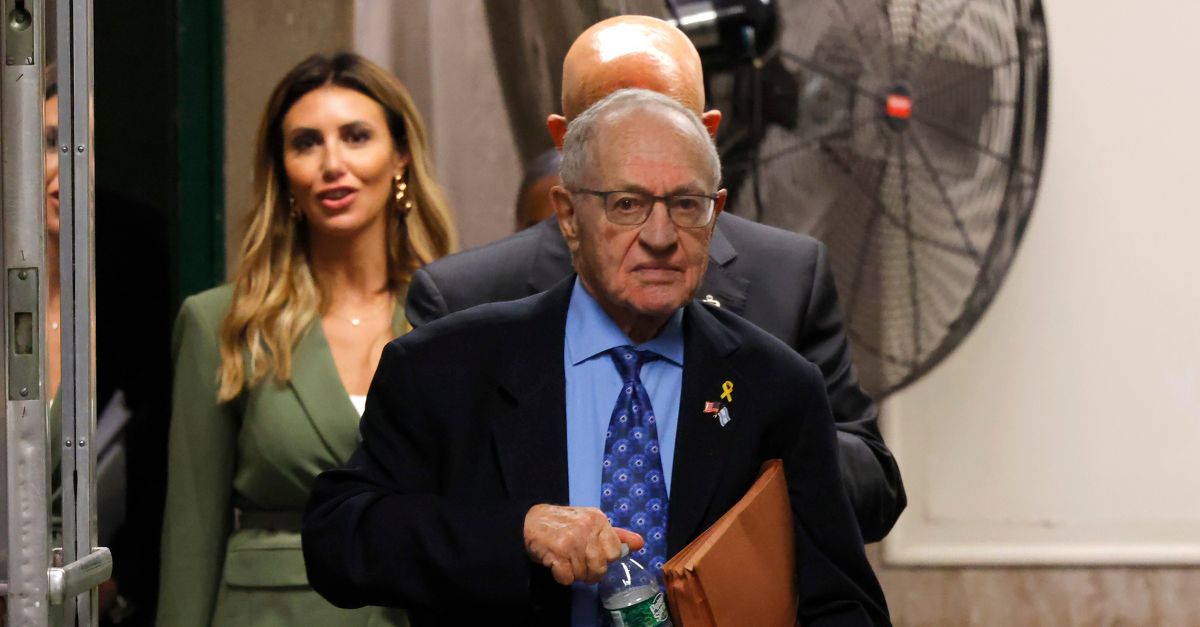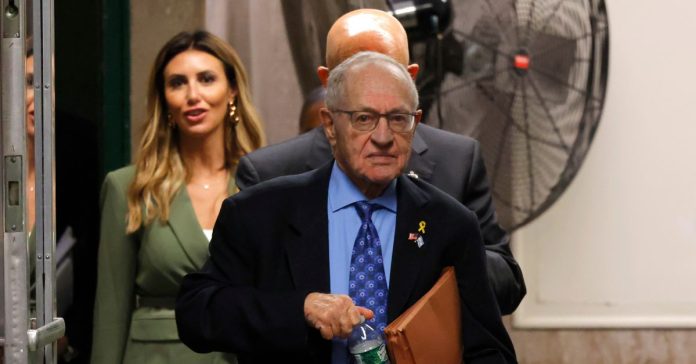
Attorney Alan Dershowitz returns to the courtroom after a break during former U.S. President Donald Trump’s at Manhattan Criminal court on Monday, May 20, 2024 in New York (Michael M. Santiago/Pool Photo via AP).
Famed criminal defense lawyer and Harvard Law School professor emeritus Alan Dershowitz lost out again in his defamation lawsuit against CNN, this time as a federal appellate court affirmed the case’s dismissal. But a concurrence from one of the judges on the 11th U.S. Circuit Court of Appeals, agreeing that CNN “simply lied” about Dershowitz’s Ukraine impeachment defense of President Donald Trump, could serve as fuel for “further review” and a possible challenge to the precedent set by the U.S. Supreme Court’s landmark 1964 defamation ruling in New York Times v. Sullivan.
Although a three-judge panel on the 11th Circuit agreed last week that Dershowitz’s lawsuit was correctly dismissed, Dershowitz tells Law&Crime of his expectation that U.S. Circuit Judge Barbara Lagoa’s concurrence will at least “in part” form the basis of a request to keep the case alive — and that is significant because Lagoa, once seen as a potential SCOTUS contender after the death of Justice Ruth Bader Ginsburg, followed in the footsteps of Justice Clarence Thomas by suggesting the high court should rethink the decades-old case.
Writing for the court first, U.S. Circuit Judge Britt Grant, a Trump appointee, said that Dershowitz “offered no evidence” that CNN commentators or reporters “intentionally” misled their audience on the substance of his impeachment defense. Rather, Grant said, the record shows “they believed in the truth of their reporting,” “formed their opinions independently,” and had a “sincere” belief that their allegations were true.
Dershowitz first filed the $300 million suit against CNN in September 2020, claiming the network had falsely and maliciously portrayed him as “a constitutional scholar and intellectual who had lost his mind” by misleadingly editing his impeachment defense of Trump to make it seem as if he had said the president could have an illegal motive and still avoid impeachment.
Recall that Sen. Ted Cruz, R-Texas, had asked Dershowitz if it mattered whether there was a quid pro quo, after it was alleged that Trump abused his power by corruptly withholding military aid to Ukraine on the condition that its president announce an investigation into Joe Biden ahead of the 2020 election.
“The only thing that would make a quid pro quo unlawful is if the ‘quo’ were in some way illegal,” Dershowitz began to answer, naming as “three possible motives” for seeking the “quo” the public interest, political self-interest, and financial self-interest.
On “public interest,” Dershowitz told Cruz that “[e]very public official that I know believes that his election is in the public interest, and mostly you’re right — your election is in the public interest — and if a president does something which he believes will help him get elected — in the public interest — that cannot be the kind of quid pro quo that results in impeachment.”
Dershowitz alleged in his complaint that CNN’s selective editing and quote cherry-picking put forth a “one-sided and false narrative that Professor Dershowitz believes and argued that as long as the President believes his reelection is in the public interest, that he could do anything at all – including illegal acts – and be immune from impeachment.”
And, on that score, his complaint adequately pleaded actual malice to survive a motion to dismiss, with a federal judge agreeing in May 2021 that CNN had “presented an official proceeding in a misleading manner[.]”
But the case would not survive summary judgment, as a sympathetic U.S. District Judge Raag Singhal concluded that New York Times v. Sullivan, which established the “actual malice” standard for public figures alleging defamation, is still the law of the land — and Dershowitz fell short of meeting that standard.
“Dershowitz complains that he was defamed by the way CNN covered his arguments. The blurring of the distinction between ‘news’ and ‘commentary’ fosters sympathy for Dershowitz’ position. Dershowitz’s Complaint raised important issues and this Court determined at the motion to dismiss stage that Dershowitz should have the opportunity to develop evidence that would show that CNN’s reporting met the New York Times v. Sullivan standard of actual malice,” Singhal wrote in April 2023. “After full discovery, extensive briefing, and oral argument, the Court concludes that he has not.”
For the same reason, Grant said Friday, the lower court’s dismissal was affirmed.
“For a public figure like Dershowitz to prevail, defamation law has long required proof of a speaker’s actual malice: knowledge of or reckless disregard for the falsity of a statement. But here, the available evidence points to the reporters’ sincere — if mistaken or even overwrought — belief in the truth of their accusations,” she wrote. “Dershowitz has presented no evidence that shows otherwise. We therefore affirm the district court’s order granting summary judgment to CNN.”
Love true crime? Sign up for our newsletter, The Law&Crime Docket, to get the latest real-life crime stories delivered right to your inbox.
Lagoa, also a Trump appointee, concurred that the law as it stands required this outcome, but she was more forceful in saying that CNN had “simply lied” about Dershowitz and that the “only thing standing” in the way of him being able to take the case before a jury and get “justice” is the New York Times v. Sullivan case, which she says caused “harm” to the law.
“I concur with the majority because, under New York Times Co. v. Sullivan, we are obliged to hold public-figure defamation plaintiffs to the actual-malice standard — a standard that ‘has no relation to the text, history, or structure of the Constitution,'” wrote Lagoa, quoting the late Senior U.S. Circuit Judge Laurence Silberman. “I write separately to explain my view of the harm Sullivan has caused in our First Amendment jurisprudence.”
“As a preliminary matter, there can be little dispute that CNN ‘defamed’ Alan Dershowitz under any common understanding of that term. CNN, through its various writers and anchors, repeatedly misrepresented statements that Dershowitz made on the floor of the Senate — that is, statements whose accuracy could easily be verified against the Senate transcript and video footage, and which CNN’s employees all could have watched live,” the judge went on. “In some instances, they blurred the line between fact and commentary, and in others, they simply lied about what Dershowitz had said.”
Lagoa opined that Dershowitz may have had an argument as far as damages were concerned, but that was not to be, given SCOTUS precedent.
“And — though damages were not ultimately tested at trial — Dershowitz offered evidence at the summary judgment stage to show that he was harmed as a result because news outlets he finds more desirable stopped inviting him to speak after the CNN coverage, and he was left with access only to platforms he found less desirable,” she added. “All of this is to say, I agree with the district court that the only thing standing between Dershowitz and justice is Sullivan.”
Calling New York Times v. Sullivan and cases that followed it “policy-driven decisions dressed up as constitutional law,” Lagoa lamented that “defamation victims” of similar status to Dershowitz “are left with scant chance at recourse for clear harms.”
“But until the Supreme Court reconsiders Sullivan, we are bound by it, and I therefore must concur,” she noted.
Notably, Senior U.S. Circuit Judge Charles Wilson, a Bill Clinton appointee, separately concurred but offered words of caution for those who would seek to overturn Times v. Sullivan:
Overruling Sullivan would be especially disruptive because the case defines “the central meaning of the First Amendment” and influenced “virtually all of the Supreme Court’s subsequent First Amendment jurisprudence.” Casting the decision aside in favor of varied, plaintiff-friendly state libel laws would “create an inevitable, pervasive, and serious risk of chilling protected speech pending the drawing of fine distinctions that, in the end, would themselves be questionable.”
Out of respect for unanimous Supreme Court precedent, and the press freedoms that played a critical role in securing the civil rights many in this country hold dear, judges should reconsider their calls for the Supreme Court to overrule Sullivan. “For it is hard to overstate the value, in a country like ours, of stability in the law.”
In response to Law&Crime’s questions about whether he would seek an en banc rehearing at the 11th Circuit or file a petition with the Supreme Court challenging New York Times v. Sullivan, Dershowitz pointed to Lagoa’s concurrence and said he intends to keep litigating.
“We intend to seek further review based in part on the concurring opinion that correctly concluded that CNN ‘lied’ about me. The trial judge also found that I had not said anything close to what CNN falsely claimed I said,” he told Law&Crime. “A jury, not judges, should be allowed to decide whether CNN’s defamations were malicious.”

